AMERICA ACTS
HE more or less normal vicissitudes of the war in the past week—progress in Abyssinia and Somaliland, progress Greece, the sinking of an Italian cruiser, an Italian raider d an Italian troopship, heavy losses of British and Allied erchant-tonnage—are dramatically overshadowed by one ominating event, the passage of the Lease-and-Lend Bill and s signature by President Roosevelt on Tuesday. After the eks of obstruction in the Senate the collapse of the opposi- on in the Chamber, the two-hour debate in the House and e immediate signature by the President came as impressive &cations of a spirit which animates nine Americans out of Try ten. Opposition to the Bill in the Senate and House rang from doubts about conferring unprecedented powers on e President, not at all from lack of sympathy with Britain d her Allies in their fight for freedom. Nothing gave clearer idence of that than what was, in its ultimate implications, e most important speech delivered in either chamber, that Mr. T. E. Martin, the Republican leader in the House of eprescntatives, on Tuesday. " We stand," he said, " united or liberty. We live, thank God, in a country where we can ebate great questions and divide as our convictions direct. ut once the decision is reached we accept the verdict of the lority. We are one people, undaunted, and determined that Americanism 'shall not diiappear from the earth "—or, it y be added, real democracy. It is an infinite encouragement d stimulus to find our own ideals voiced as forcefully and erringly in America by Republicans like Mr. Wendell Willi& d Mr. Martin as by Mr. Roosevelt and Mr. Cordell Hull. Now the President, armed with the legislative authority Itch, by superb statesnmpship, as masterly in its restraint as u i s nitiative, he has caused the country rather than the dmmistration to demand from Congress, assumes a new role the conflict. He is the executive head, not indeed of a Iligerent State, but of a State non-belligerent with all the pl!cations with which Signor Mussolini in one of the greatest , his gaucheries invested that term. Hitherto we have been urchasing from the United States everything we needed. The Administration, was co-operative to the utmost of its power, but the transaction was a business affair. We paid for what we bought, and the prospect was that when we could no longer pay in ready money we should have to cease to buy. That impasse would have been hardly less intolerable to the average democratic American, who sees Americanism and sees democracy as Mr. Martin sees it and expressed it in the,House, as it would be to Mr. Churchill or Lord Beaverbrook. That chapter, therefore, is closed, and a new one opened in which everything America can safely spare—guns, ammunition, ships, aeroplanes, food—will be at our disposal for the asking, and the question of payment deferred as a pure irrelevance till the day when the question becomes, after victory, practical politics. America remains technically neutral. Americans will not fight unless Germany forces them into war. But American material will be fighting as hard as British, and will show itself as indispensable in the conflict. And America's moral support and encouragement and comradeship, as well as her powerful diplomatic influence, will fortify us no less effectively.
We shall need it all. The Atlantic war has begun, as the figures of sinkings for the last week of February-148,00o tons —demonstrate arrestingly. One week tells no decisive story, good or ill, but it is clear that every surface vessel that can be mobilised against the submarine menace must be pressed into service. If we had to depend on our own resources we should get through, after anxious and perilous months. America's contribution will not indeed dispel either anxiety or danger, but it will both ensure the U-boats' defeat and accelerate it. Mr. Matsuoka, the Japanese Foreign Secretary, is travelling to Berlin as a reply to the Lease-and-Lend Bill. Actually the Lease-and-Lend Bill has discounted his journey in advance. What the Berlin interview may achieve we do not know. Neither does Mr. Matsuoka. But what Japan could do for the Axis, even if she took up arms, would not compare with what America is doing for us, for bounds can hardly be set to America's industrial potentiality. Her first reinforcements are already on the way, and they will not come too late.






























